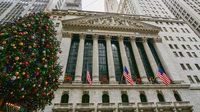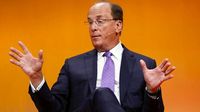BlackRock CEO Larry Fink has raised alarm bells about the U.S. economy, suggesting it may already be in a recession. Speaking on CNBC’s Squawk on the Street on April 11, 2025, Fink stated, "We’re very close, if not in, a recession now." His comments come amid growing concerns over President Donald Trump’s recent tariff policies, which Fink describes as unprecedented in his nearly five decades of experience in finance.
Fink specifically pointed to the sweeping tariffs introduced by Trump as a significant factor contributing to the current economic uncertainty. Since the tariffs were announced during the week of April 4, markets have experienced significant slumps, leading to increased anxiety among investors. On April 9, Trump announced a temporary 90-day pause on some tariffs, but Fink warned that this merely prolongs uncertainty. "Just a slowdown until there’s more certainty," he cautioned, emphasizing that the pause does not alleviate the underlying economic fears.
Fink’s concerns extend beyond just market volatility; he cautioned that these tariffs could lead to a further 20% decline in the stock market, exacerbating inflation and impacting the financial well-being of millions of Americans. He noted that the repercussions of these tariffs reach far beyond Wall Street, affecting everyday citizens’ retirement and education savings. Despite the immediate risks, Fink remains optimistic about long-term economic growth driven by advancements in artificial intelligence and infrastructure modernization.
In April alone, BlackRock has seen $20 billion in net inflows, indicating that while there is anxiety in the market, some investors are still seeking opportunities. Fink urged investors to remain calm and focus on long-term investment strategies, suggesting that the current downturn could present a buying opportunity.
The stock market did experience a rebound last week, largely attributed to Trump’s announcement to scale back higher tariffs for 90 days—excluding China. This announcement triggered the best gains in years for major indexes, with the Nasdaq enjoying its second-best percentage gain ever. However, the subsequent days saw stocks fall back, reflecting the ongoing uncertainty surrounding tariffs.
While long-term Treasury yields backed off their highs, they still reflected a significant gain, underscoring the market’s unease. Major banks, including JPMorgan Chase and Wells Fargo, have also expressed caution regarding the economic outlook. JPMorgan’s CEO Jamie Dimon noted that clients have become "more cautious" amid the volatility driven by geopolitical and trade-related tensions.
In a broader economic context, recent data reveals mixed signals. The March consumer price index unexpectedly edged lower compared to February, bringing the 12-month inflation rate down to 2.4% from February's 2.8%. Core CPI inflation cooled to a four-year low of 2.8%. However, the producer price index fell by 0.4%, primarily due to declining energy prices amid recession fears, while core PPI dipped by 0.1%. Year over year, PPI inflation slowed to 2.7%, and core PPI to 3.3%, indicating a complex inflation landscape.
Consumer sentiment has also taken a hit, with the University of Michigan reporting a significant drop, particularly in the expectations gauge, which fell to a 45-year low. The report revealed that one-year inflation expectations surged to 6.7%, the highest rate since 1981, indicating growing concerns among consumers about future economic conditions.
As the earnings season unfolds, major companies are reporting their results amid these economic uncertainties. Delta Air Lines, for instance, reported a 2% gain in earnings per share, slightly beating lowered expectations. However, the airline also warned that growth has "largely stalled" due to global uncertainties surrounding trade. Delta has adjusted its capacity growth to align supply with demand, reflecting the cautious approach many companies are taking in the current climate.
Meanwhile, health insurers have seen positive developments, with the Trump administration announcing a significant increase in Medicare Advantage payments. The 5.06% increase for fiscal 2026 is substantially higher than the 2.23% proposed by the previous administration, providing a boost for companies like UnitedHealth Group and Aetna.
In the technology sector, Taiwan Semiconductor Manufacturing Company (TSMC) reported stronger-than-expected sales, rising 39% year over year in the first quarter. This positive news bodes well for its customers, including AI chip leader Nvidia, especially as the Trump administration has backed off plans to impose restrictions on the sales of Nvidia's H20 artificial intelligence chip in China.
Despite the mixed economic signals, companies like BYD have reported impressive growth, guiding first-quarter net income up between 86% to 119% compared to a year earlier. This surge is significantly higher than analysts had anticipated, showcasing the potential for some sectors to thrive even amid broader economic challenges.
On the other hand, Walmart has pulled its first-quarter operating profit guidance, citing tariff uncertainty as a primary concern. The retail giant had initially forecast a modest gain in adjusted operating income but has now shifted its outlook while still expecting 3%-4% sales growth in the April-ended quarter.
In summary, as the U.S. economy navigates through these turbulent waters, the cautious sentiments of financial leaders and mixed economic indicators highlight the complexity of the current landscape. With ongoing tariff uncertainties and shifting consumer sentiments, many are left wondering what the future holds for the economy and their investments.





